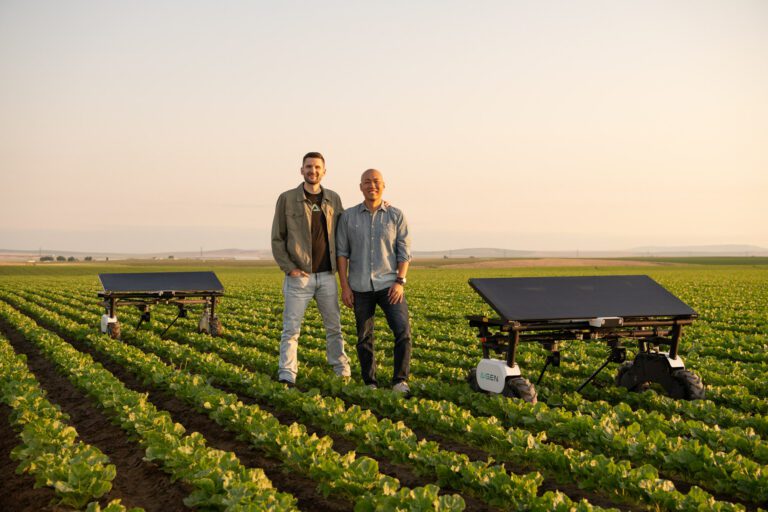TL;DR:
- Ag-tech startups in the Pacific Northwest are utilizing AI to revolutionize farming.
- Aigen, a Seattle startup, introduces a solar-powered robot that eliminates weeds and gathers real-time crop data.
- AI models are also being trained using aerial imagery and per-plant data for high-value crops by ventures like Pollen Systems.
- Challenges include sourcing accurate ground truth data and enhancing AI model accuracy.
- Farmers’ openness to adopting ag-tech products is increasing due to rising costs and changing demands.
- AI-powered tools hold the promise of improving productivity, resource conservation, and sustainability.
Main AI News:
Innovation knows no bounds, and now, even the farming landscape is reaping the benefits of cutting-edge technology. In the Pacific Northwest, a surge of ag-tech startups is wielding the power of artificial intelligence and machine learning to revolutionize farming practices. These startups are sowing the seeds of change by deploying AI to tackle age-old challenges like weed control, crop health monitoring, and field analysis.
One such trailblazing venture is Aigen, a Seattle-based startup led by CEO Kenny Lee. Collaborating with former Tesla engineer Rich Wurden, they channeled their expertise towards agriculture, spurred by their shared passion for climate issues. Their brainchild, a revolutionary robot, autonomously eradicates weeds while simultaneously gathering vital data for farmers. Powered by a cutting-edge, low-energy AI model, Aigen’s robot operates on solar power, transmitting real-time crop insights to a cloud-connected mobile app.
This stride towards autonomous farming is not just about convenience; it’s about rewriting the rules of the game. Imagine a world where farming machinery operates without the need for constant charging infrastructure, batteries, or diesel. Aigen and likeminded companies are spearheading this vision, with Carbon Robotics, another Seattle startup, making waves with their weed-zapping robots. Having secured $30 million in funding and accolades like the Hardware/Gadget/Robotics of the Year award at the GeekWire Awards, Carbon Robotics is emblematic of the transformative power of AI in agriculture.
However, the path to agricultural AI utopia is riddled with obstacles. The core challenge lies in obtaining accurate, ground truth data that can fuel the engines of AI models. Rich Wurden points out that large-scale datasets are the lifeblood of AI, yet they are an incredibly scarce resource due to the difficulties and expenses involved in their collection. Aigen’s robots, on the other hand, brave the soil’s surface, amassing data mere centimeters from the plants. Other companies resort to drones, IoT devices, and satellite imagery to cultivate their AI models.
Pollen Systems, a burgeoning ag-tech startup in the Seattle area, has adopted a unique approach. They harness aerial imagery and per-plant data to train their models, focusing on high-value crops like wine grapes, apples, and avocados. Keith McCall, the visionary behind Pollen Systems, envisions AI assistants customized for farmers, offering real-time insights on irrigation, pesticides, fertilizers, and management strategies.
Yet, challenges persist. Vivek Nayak, co-founder and VP of Engineering at TerraClear, reveals the struggle to elevate model accuracy from moderate to exceptional levels. While doubling input data might seem like an intuitive solution, the real journey involves experimenting with diverse model architectures and innovative techniques in computer vision. Nayak insists that precision and recall can be significantly enhanced through strategic model sampling and other avant-garde techniques.
As AI takes root in agriculture, it’s important to remember that this journey is still in its infancy. McCall emphasizes the pivotal role AI can play in helping farmers optimize their methods and navigate the complexities of modern agriculture. With the pressures of rising costs and evolving consumer demands, the farming community is increasingly embracing ag-tech solutions. A McKinsey & Co. report highlights that 39% of surveyed farmers globally plan to integrate at least one ag-tech product within the next two years.
Conclusion:
The surge of AI-powered ag-tech startups in the Pacific Northwest signifies a transformative era for agriculture. Innovations such as Aigen’s weed-zapping robot and Pollen Systems’ per-plant data analysis showcase the potential for improved productivity and sustainability. Despite challenges in data sourcing and model accuracy, the increasing adoption of ag-tech products by farmers is creating a burgeoning market ripe for technological disruption. As the agricultural sector embraces these innovations, the stage is set for a future where AI redefines farming practices and contributes to a more efficient and environmentally conscious industry.

